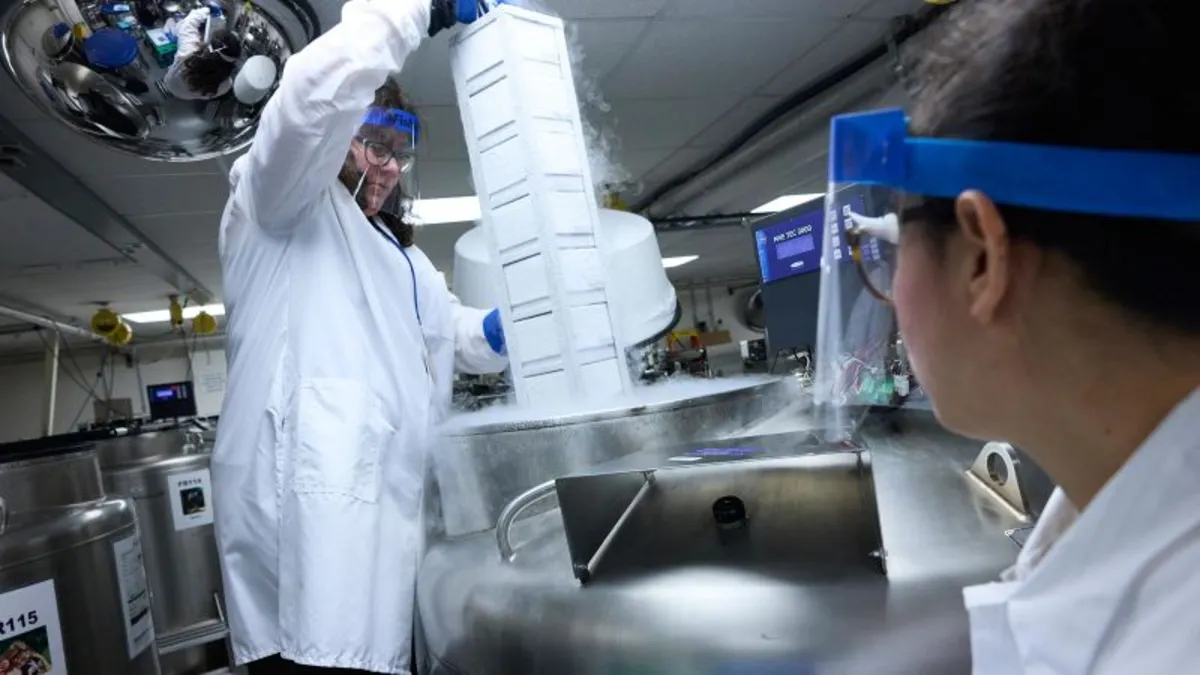
A priceless treasure trove of biodata collected from generations of Americans is at risk of being lost due to recent funding cuts instituted by the Trump administration. Dr. Walter Willett, a prominent nutrition researcher at Harvard T.H. Chan School of Public Health, expressed his concerns in an interview with CNN. The latest round of funding cuts will halt the financial support necessary for the maintenance of dozens of giant freezers that house critical biological samples, including DNA, blood, urine, stool, and tissue samples essential for ongoing research.
These biological samples were collected over decades as part of the Nurse’s Health Study, recognized as one of the largest and longest investigations into women’s risk factors for chronic disease. Alongside this, the Health Professionals Follow-Up Study has monitored the health and dietary habits of men through extensive questionnaires. “We’ve been following almost 300,000 women and another 50,000 men for about 45 years,” Willett stated, highlighting the vast amount of data gathered over the years. His extensive research portfolio includes over 2,000 original papers and reviews focusing on the link between nutrition and health.
The biological samples and associated data from both studies have significantly advanced medical science. Notable discoveries include the identification of the dangers of trans fats, which led to a ban from the US food supply, the association between obesity and breast cancer—even in adolescents—and the connection between cigarette smoking and heart disease. Willett emphasized the urgency of the situation: “We are scrambling to try to protect the samples and the data we have,” noting that without additional funding, their existence is threatened.
Harvard T.H. Chan School of Public Health, which relies on the federal government for approximately 46% of its funding, is already reeling from $2.2 billion in cuts to federal grants and contracts announced earlier in the year. Andrew Nixon, director of communications for the US Department of Health and Human Services, stated, “The federal government has a responsibility to ensure that taxpayer dollars do not flow to institutions that allow open harassment of Jewish students or tolerate antisemitic intimidation.” He underscored that any institution, including Harvard, must adhere to these civil rights standards to receive federal support.
Dr. Wei Zheng, an assistant professor of pathology at Emory University, emphasized the invaluable nature of the Harvard data collected over years. “They are fundamental to identifying biomarkers for early detection of diseases, understanding risk factors, and informing effective prevention strategies,” Zheng noted. He has utilized Harvard's data in his own research, pointing out the critical role these samples play in advancing medical knowledge and improving public health outcomes.
The biodata from the Nurse’s Health Study is stored in large freezers maintained at a significant annual cost, which Willett estimates to be several hundred thousand dollars. This figure does not account for the costs associated with staff or laboratory supplies. “We have blood that we use for DNA analysis and urine samples that allow us to measure contaminants,” Willett explained. The collection includes toenail clippings suitable for trace metal studies, stool, and oral samples designated for microbiome analysis, as well as tumor tissues from women who developed breast cancer.
Willett and his team were pioneers in establishing the link between even modest alcohol consumption and breast cancer. This connection has become widely recognized as a significant risk factor for a disease that tragically claims the lives of over 42,000 women annually. Moreover, data from the long-term studies can reshape prior research conclusions. For instance, earlier findings from the Framingham Heart Study suggested that smoking was not a risk factor for heart disease in women, a notion that the Nurse’s Health Study has since debunked.
Numerous investigators, both nationally and internationally, utilize this data for their research, confirming its status as a vital national resource. As study participants reach remarkable ages, the data will soon provide insights into lifestyle factors contributing to longevity. “We’re just coming to that point in our study where we can explore these questions,” Willett stated, emphasizing the potential findings that could be lost without adequate funding.
In a recent development, the Trump administration announced the elimination of all research grants to Harvard in a letter from Education Secretary Linda McMahon. This letter accused the university of “ugly racism” and violating federal law, stating Harvard would have to operate as a privately-funded institution. McMahon questioned why Harvard, with a staggering $53 billion endowment, could not fund its projects through donations and internal resources.
However, accessing these endowment funds is not straightforward. Most of the endowment is earmarked for scholarships, faculty positions, and academic programs, making immediate access challenging. Harvard has stated that it has been covering nearly two-thirds of its operating expenses through federal research grants and student tuition. In response to the funding cuts, Harvard has filed a lawsuit against the administration, asserting its right to independence and constitutional protections. The lawsuit argues that the government has failed to establish a logical connection between its concerns over antisemitism and the critical research aimed at saving lives and fostering innovation.